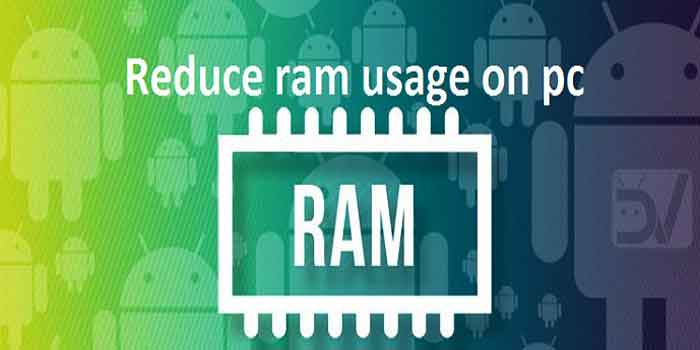Your computer's Random Access Memory (RAM) is temporary memory for executing programs and services. It cannot store data since it is a volatile sort of memory. You can't utilize a computer without RAM since a computer requires a place to store executable files temporarily. Although the RAM is a hardware component that can be changed, this blog offers advice on lowering RAM consumption so that you won't need to spend money on new hardware.
If the available RAM space runs out, your computer may function slowly or experience BSOD difficulties. In addition, some programs swap out more RAM than is necessary, which causes frequent crashes and delays in response. This article will discuss several efficient ways to lower memory utilization on a laptop or computer.
Some apps and applications take up much storage space. Take Google Chrome, for example; each new tab you open swaps out memory, slowing your machine. Memory utilization below 80% is typically average if you run many apps simultaneously. If RAM utilization increases by 80%, this is a problem that has to be fixed.
Your PC will run faster if you free up more RAM. It also depends on how much RAM your machine has loaded. The performance of an 8GB RAM PC would be inferior to one with 16GB of RAM. let's catch up on what happens if a computer is low on RAM.
What Happens if a Computer is Low on RAM?
On a computer, everything we do takes up some space. As an illustration, even when we right-click on a desktop, the RAM uses a little memory address. As a result, your computer will be lethargic and be unable to do even the most basic activities if its RAM is almost full.
If your RAM utilization is excessive, you may experience sporadic system or program crashes, loading problems with apps, difficulty loading webpages in the browser, and a general decline in performance. But, there are some ways this usage can be detected and reduced. So, let's focus on them.
How To Reduce Higher RAM Usage On PC:
Even while having more RAM can make the system run several programs smoothly if you have adequate free memory, there is no benefit to having less physical memory. But having little memory has an impact on how well the machine performs. Here are a few examples:
1.Restarting your computer:
The most common method of PC improvement is restarting your computer. Since data is only held on your RAM module for a brief period, restarting your computer or laptop can remove the data and free up additional RAM space. It's time to proceed to the next phase if this doesn't work for you.
2. Turn off background applications:
Even after being closed, a program may occasionally operate in the background. This could consume RAM needlessly. To stop the background program, adhere to the following instructions.
- To launch Settings, press the Windows key + I.
- Visit Apps > Apps & Features next.
- Select Advanced settings by clicking the three vertical dots in any program.
- Click on the selection menu next to the permission for background apps and choose Never. By doing this, the background operation of the program will be disabled.
- The easy way is to turn off background apps is to use of the RAM Cleaner.
3. Disable startup application:
A starting application is one of the leading causes of your computer's excessive physical memory utilization. These programs use a lot of RAM and launch automatically when the operating system starts. Therefore, please carry out the following actions to remove the startup program:
- Start by simultaneously hitting Ctrl, Shift, and Esc to launch the Task Manager.
- On the Startup tab, click.
- The list of starting programs is shown below.
- Disable is the option when you right-click the application that has a Low, None, or Not Measured as Startup Impact. Your machine should use less RAM than before after restarting.
4. Adjust virtual memory in Windows:
A portion of the memory from your storage devices is automatically used by your computer when it runs out of RAM. It is referred to as virtual memory.
The page file, which takes some storage from the hard drives, is used by the computer when it wishes to use the virtual memory. The page file accepts the extra data from the RAM. Therefore, you must expand the size of this page file to increase the virtual RAM.
This does not, however, imply that you may increase the virtual RAM to an absurd level. The number of changes you make to the virtual memory is limited. You can add up to three times as much virtual RAM as physical RAM, with a minimum of 1.5 times each.
5. Use dedicated graphic cards:
Computers use physical memory without specialized GPUs as shared visual memory. Therefore, if your system just has integrated graphics, it will use RAM to carry out activities that need plenty of graphics processing power. Unfortunately, this makes your system choppy when gaming utilizing a lot of RAM.
6. Scan for virus:
Malicious software and files on a computer might lower its overall speed or even cause it to crash. Therefore, it is advised that you run a PC antivirus check if you do not see any applications utilizing a lot of RAM in the Task Manager.
However, running antivirus software has a drawback because it consumes a lot of RAM, making your system even slow. In addition, the Windows Defender default program may check the machine for viruses.
The Bottom Line:
These were the best techniques for lowering a PC or laptop's excessive RAM use. To troubleshoot the problem, use each of these techniques individually.















We Are Providing You Buy App Installs.
ReplyDelete